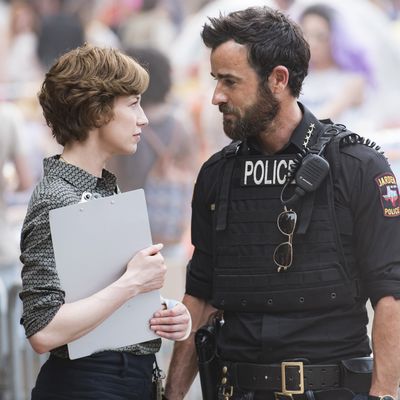
The superb final season of The Leftovers takes us Down Under, to Australia. But as always, the show’s true focus is on the underworld — or the other side, or heaven, or whatever the characters choose the call the place that they believe contains their loved ones, seven years after a Rapture-like event disappeared hundreds of millions of people. By this point, a dedicated viewer of Damon Lindelof and Tom Perrotta’s series will feel certain that there’s something beyond what we can see on earth, because cop Kevin Garvey (Justin Theroux) — apparently an unkillable, shamanlike figure —visited it in season two’s “International Assassin.” But we don’t know if other characters besides Kevin can access it in quite the same way.
This poses a conundrum for Kevin’s girlfriend, Nora Durst (Carrie Coon), a fraud investigator for the government. In season three, she finds herself investigating a furtive and shady bunch of Australian entrepreneurs, who claim to have invented a machine that can transport people to the afterlife. Even a cursory examination of the scenario they describe makes it sound as if participants are paying good money to be disintegrated inside of a device that sounds alarmingly like a human-size microwave oven. But Nora is so obsessed with reconnecting with the family she lost on the day of the Event that you can immediately tell she’s considering the possibility. This is but one more example of how The Leftovers puts its characters in the position of having to contemplate the unthinkable, or the scientifically impossible or unknowable. The intangibles and gray areas are where the show tends to live. Kevin’s ability to kill himself at will, and dip into the afterlife like a deep-sea diver, sums up what The Leftovers allows its audience to do each week. Well, for eight more weeks, anyway.
The very existence of a third season of The Leftovers is a different sort of miracle. In retrospect, it seems strange and wonderful that this show existed in the first place. The first season, which was set one year after the Departure, was about as grim as television has gotten. That said, I (and others) found great therapeutic value in a series that amounted to a grief chamber that the audience could enter at will — a place to confront emotions and ideas that Westerners (perhaps most notoriously, Americans) are trained from birth not to discuss because they’re impolite and make everybody uncomfortable. Sometimes you need a good cry, and this show gave it to you. A lot of times that was the whole point of it — that, and creating a safe space where characters could ask the sorts of big questions about death, grief, trauma, mourning, and the constant pressure to move on that are almost never permitted anywhere else in popular culture, even on dramas that are otherwise comfortable with life’s darker matter. HBO’s Six Feet Under served much the same function back in the day.
I don’t want to say too much about this new season before you’ve all had a chance to watch it; I’ll revisit it periodically as it unfolds. Suffice to say that Lindelof, Perrotta & Co. have continued to think about ways to make the fantastic seem mundane and vice versa. The one thing that unites a lot of great but otherwise disparate fantasies is their ability to ask, “If something like this actually happened, or if a world like this actually existed, what would it be like to live in it day to day?” The Leftovers has always been very good about doing and then showing that kind of homework, and you see many more examples of it during this final run of episodes — from the sidebar discussions of which celebrities survived the event and which perished (that ongoing tidbit about the cast of Perfect Strangers gets paid off in an eerily powerful way here) to Reverend Matt Jamison (Christopher Eccleston) writing a New and Improved Testament that draws on the story of Kevin, a sad-eyed American Jesus with washboard abs.
This season is also drily funny. Funny is not a word that would’ve sprung to mind during season one, or even throughout much of season two. Time has a way of putting a more analytical frame around events that were stupefying at the moment they first occurred. That’s what seems to have happened here, particularly for Kevin; Nora; Kevin’s ex-wife, Laurie (Amy Brenneman); and John Murphy (Kevin Carroll), whose daughter disappeared in season two. The sheer absurdity of humankind’s most mysterious global tragedy seems to have finally sunk in, and there are sardonic asides along with the discussions of morality and philosophy, plus some Fellini-esque images and situations that make post-catastrophe life seem less like a funeral, and more like a circus.
I’ve moved past depression and into acceptance when it comes to this series, but I’m still going to miss it when it’s gone.


